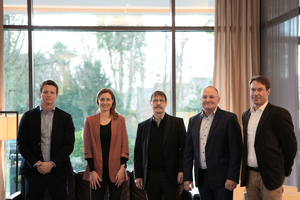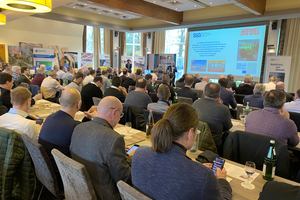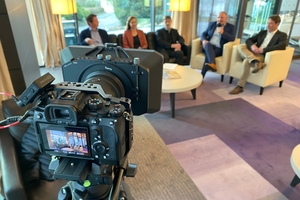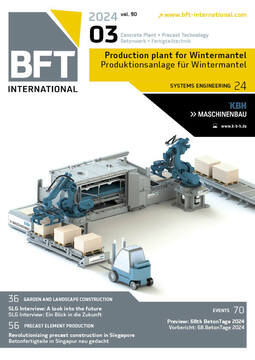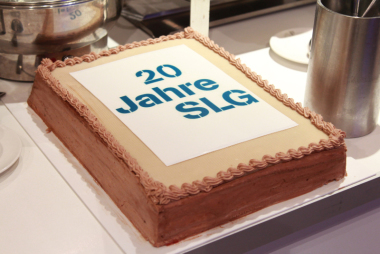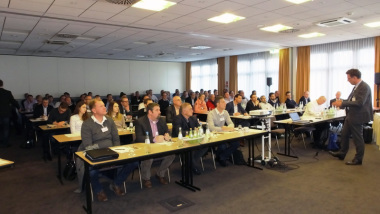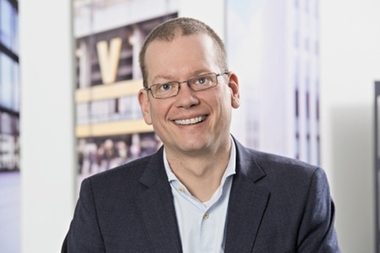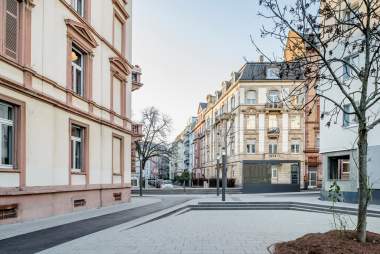Interview: A look into the future – What are the expectations of the concrete block industry for 2024?
In early February, the the German Concrete Association for Road, Landscape and Garden Construction (Betonverband Straße, Landschaft, Garten e.V./SLG) – organized the 12th SLG Plant Manager Meeting with around 140 participants in Bad Lippspringe, Germany. BFT editor Karla Knitter made use of the opportunity to talk with the Betonverband executives Andreas Schlemmer (First Chairman), Dietmar Ulonska (Managing Director), Alexander Winzer (Deputy Managing Director) and Michael Fuchs (Technical Director) about the current situation and the future of the concrete block industry.
BFT International: Dear Sirs, what specific initiatives and projects does the Betonverband SLG plan for 2024?
Betonverband SLG: This year, SLG will continue to deal with the topic of sustainability and ecology. We assume that we will go into greater detail within the scope of this interview.
In addition to the important topic of sustainability, we, as a technically oriented association, have additional tasks and projects. We will, for example, revise the data sheets on the topics of mechanical laying, production boards and the cleaning of block and slab pavements.
Another priority will be the in-house training sessions at our member companies, where we provide ongoing training in application engineering and technical regulations for indoor and outdoor sales personnel.
With all the important tasks in matters of sustainability and technology, we must not lose sight of the regulatory specifications. In this regard, we keep informed of European and national legislation – currently, in particular, on the new version of the Construction Products Regulation (EU-BauPVO), sustainability reporting and the Product Safety Regulations (ProdSV). On this thematic block we will hold our own information event in April of 2024.
BFT International: Which events would you like us to pay special attention to?
Betonverband SLG: In spring, we’ll start with a new live event on legal requirements and on the broader political framework in the context of sustainability and law. For May, we are looking forward to meeting again in Ulm. The 68th BetonTage will be held from 14 to 16 May 2024, at which SLG will co-organize the first day of the event under the motto “Urban Design of Living Spaces.” Our annual SLG general meeting this year will take place on 15 November 2024. The end of the year will be marked by the 10th Technical Conference for Concrete Block Pavement Construction Methods in November 2024. Here you will experience exciting topics in the development of technical rule frameworks and their application to our products. You will, of course, be cordially invited to all of our events.
BFT International: Throughout the year, there will be major personnel changes in your Association. Can you explain to our readers what they are?
Betonverband SLG: Mr. Dietmar Ulonska, after 30 and a half years of being actively involved in our Association for the concrete block industry, including 26 years as managing director of SLG, will retire at the end of the year. The Association has already begun to arrange his successor in good time and appointed Mr. Alexander Winzer, his successor, on 1 January 2024 – with initial assignment as Deputy Managing Director. Mr. Michael Fuchs was appointed, effective on 1 January 2024, as Managing Technical Director. We consider ourselves well-positioned in this constellation and hope in due time to effectively fill the large footsteps that Mr. Ulonska will undoubtedly leave behind.
BFT International: The German construction industry is currently experiencing a crisis. There has been a sharp drop in the demand for housing construction, and there is a shortage of skilled workers in underground construction. How badly does that affect the members of the Association? Is the concrete block industry also in a crisis?
Betonverband SLG: The decline of around 23 % in approvals in the housing sector during last year is the key factor for the continuing tense situation in the construction industry. The lack of approvals and implementation work in construction of private single- and two-family homes has placed a strain on the order- and turnover situation of the industry. Developments in sustainability and the resulting increase in costs has made raw materials more expensive for the concrete block industry.
Extraction of sand, gravel and chips is negatively affected by lengthy planning and approval processes, leading to uncertainties among manufacturers. High energy prices have had a drastic effect on the quarrying industry as well as on cement manufacturers. At the same time, the resulting cost increases in these sectors has significantly increased purchasing costs for concrete block manufacturers. Unfortunately, the required price increases in the road construction products of our members were only partly able to offset the increases in the relevant basic raw materials.
BFT International: What is your prognosis for your industrial sector for 2024?
Betonverband SLG: Why have more and more Germans reduced their demand for construction work? Because they could simply could not or would not spend the money. The cost for financing private households and loans for real estate and corporation financing are at a very high level compared to previous years. This will continue to dampen general demand in the construction industry. Investments in construction are expected to drop by around 5% on an annual average. The inflation rate shows a positive development. At the end of 2023 it levelled out at around 3.0%, which can be regarded as a positive sign. Here, too, a close look is required to see where certain areas ease off and where the economy continues to be strongly affected: keyword energy costs.
For 2024, economic analysts do not forecast an economic upswing. The GDP is expected to be slightly negative for the second year running. There can accordingly be no talk of an upbeat mood at the beginning of 2024. At the same time, German society is facing demographic and political challenges that will have a direct impact on the economic development of Germany as a business location.
For companies in the concrete block industry, it will be impossible to decouple from this development. Increased financing costs and the high costs of material and housing construction likewise did nothing to improve the framework for increased demand in private residential construction.
Hope, however, arises from the budget resolution of the German House of Representatives, which plans to spend an additional one billion euros each year for climate-friendly housing newbuilds in 2024 and 2025. If timely implemented in 2024, these investments in housing construction can contribute to the recovery of the order situation as well as of the downstream public works sector. We are convinced of the concrete block as a viable product, notwithstanding the tense economic situation. Positive properties in terms of durability, aesthetics and functionality make the concrete block a construction product that will continue to be much in demand for surface stabilization in private and inner-city areas in the coming years.
BFT International: What do your tasks in the area of sustainability look like? How does SLG deal with this key topic?
Betonverband SLG: Already before adoption of Agenda 2030 for sustainable development, and before the United Nations Paris Agreement on Climate Change was adopted in 2015, Betonverband SLG was the first construction materials association to establish eco-balances for road construction that were in compliance with the relevant standards. SLG was therefore in a situation to compare these eco-balances, which were accordingly robust and reliable, and to develop the EPD Concrete Block Gray with Facing. During the following years, SLG published further publications on the ecological advantages of pavement construction paved with concrete block elements.
Following the adoption of the European Green Deal in September of 2021, Betonverband SLG intensified implementation of its sustainability objectives – especially in its activities for climate neutrality by 2050. SLG subsequently bundled these objectives in the Task Committee for Sustainability (AA NH), which it formed in September of 2021. In 2022, AA NH, within the scope of its work and in collaboration with the prestigious Future Camp Limane GmbH, set up the project Ways for Climate-Neutral Concrete Block Production. SLG subsequently provided its members with a Cost Avoidance Calculator as a tool for determining their companies’ carbon footprint, as well for working out a target reduction path for the concrete block industry for achieving climate-neutrality by 2025. All of this within the scope of the follow-up project Benchmark for CO2 Saving, taking into consideration the requirements of the Science-Based Targets Initiative as internationally recognized standard.
These efforts demonstrate that the concrete block industry was not only concerned with the ecological aspects of sustainability early on, but that it had also assumed a pioneering role. It likewise evidences that it is aware of its social responsibility for sustainable transformation of the German economy, and that it is well on its way toward achieving climate neutrality.
A selection of sustainability projects since founding the AA NH:
“Ways for Climate-Neutral Concrete-Block Production” (edition of 2022)
Recommendation for CSC certification as a uniform industry standard along the added-value
chain represented by concrete
Benchmark for CO2 saving (edition of 2023)
Collaboration in the Construction Product Advisory Board of the non-profit German Society
for Sustainable Construction (DGNB) (since 2023)
Revision of the Comparative Eco-Balance for road paving (2024)
BFT International: Is the use of secondary raw materials a central topic of your Association?
Betonverband SLG: Yes, the Sustainability Task Committee is intensively involved with the sustainability objective of the circular economy. This concerns not only alternative binders such as fly ash and granulated slag for reducing cement content, but also savings through the use of natural aggregate in the form of recycled material.
In this context, to determine its starting position, the Betonverband in 2021 invited its members to participate in a survey on the use of RC aggregate. This result showed, in essence, that as many as two-thirds of the member companies use RC aggregate, until now primarily from rejected and faulty products in their own plants. The reason for this is primarily the lack of available RC aggregate from external material of uniform quality.
In 2023, this prompted the Betonverband to hold its first Member Workshop on the subject with motivational speeches, focused on legal and technologically related concrete requirements for use of RC aggregate, as well as on approaches for improved substance flow management. The workshops are followed by an exchange of experience on possible solution approaches. In addition to two lectures on the current raw materials situation at our own 12th Plant Manager Meeting, a second Member Workshop is planned on the topic of RC use, which emphasizes more use of RC aggregate in the sense of upcycling in the concrete block industry.
BFT International: One of your major fields of activity is permeable concrete paving blocks. Why are these blocks becoming increasingly important?
Betonverband SLG: The permeable construction method with concrete blocks has been applied in Germany for more than 35 years. At its initial time, it was the technical response to the marked increase in residential and traffic areas and to the resulting soil sealing. Working out the appropriate designs and relevant publications for this construction method were among the first tasks that the Technical Committee for Road, Landscape and Garden Construction, launched in 1994, concentrated on. This Technical Committee, as well known, is the predecessor of today’s Betonverband. The body of technical specifications covering permeable surfaces, which we helped to draft, has existed for over 25 years.
Over the past decades, interest in permeable pavements has not always remained consistently high. But it has significantly risen again in recent years, following the enormous damage and immense human suffering caused by floods. Sustainable management of water in our towns and communities, including such measures as desealing, infiltration and storage, are part of the national water strategy that the German government passed in March of last year. Permeable pavements are today an established part of every rainwater management system for every plan for resilient urban living spaces. The permeable concrete block systems of our member companies are providing an important and valuable contribution towards reducing negative impacts on the environment.
BFT International: Many thanks for this interesting
Interview! (Interview: Karla Knitter, M.Sc.)
CONTACT
Betonverband Straße, Landschaft, Garten e. V. (SLG)
Schlossallee 10
53179 Bonn/Germany
+49 288 95456-21

